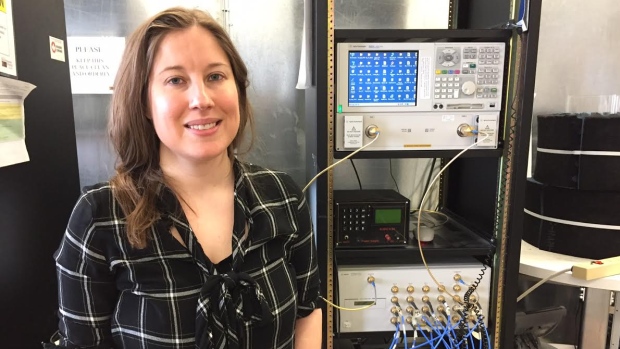Winnipeg entrepreneur and scientist Anastasia Baran in the engineering lab at the University of Manitoba.
The 32-year-old has a a PhD in electrical engineering, a masters in astrophysics and is the COO of a technology company.
copyright by www.cbc.ca
 Winnipeg entrepreneur and scientist Anastasia Baran has advanced degrees in electrical engineering and astrophysics, and is the chief operating officer of a technology company. But she launched her career by helping to send rodents to space. It was part of a summer internship at the Massachusetts Institute of Technology, where she worked on designing a space satellite to house mice. “They were sending a bunch of mice into space and needed someone to make sure the mice were safe in terms of radiation levels,” said Baran. “So I went out to MIT and helped them design their satellite.”
Winnipeg entrepreneur and scientist Anastasia Baran has advanced degrees in electrical engineering and astrophysics, and is the chief operating officer of a technology company. But she launched her career by helping to send rodents to space. It was part of a summer internship at the Massachusetts Institute of Technology, where she worked on designing a space satellite to house mice. “They were sending a bunch of mice into space and needed someone to make sure the mice were safe in terms of radiation levels,” said Baran. “So I went out to MIT and helped them design their satellite.”
From Mice to Casinos
Since then, Baran has completed a doctorate at the University of Manitoba, focusing on breast cancer research that uses safe and inexpensive microwave imaging. She’s currently the COO of nQube Data Science, a company that specializes in designing software that solves difficult optimization problems.The artificial intelligence-based software, called Qubist, harnesses optimization techniques to track casino customers’ behaviour in order to maximize gaming revenue and the player experience. The software does that by using an advanced mathematical model of the behaviour of people on the casino floor. It analyzes people’s experience and, in turn, can help casino management decide where to place slot machines. The hope is that people will spend more time, and money, at casinos.
And from Casinos to Breast Cancer Research
Her next quest is for nQube to fund her other interest: microwave breast cancer imaging. “We take low-energy microwaves in order to do breast cancer imaging,” she explained. “The benefit is that it’s very inexpensive compared to other modalities out there, and it’s safe. It’s basically the same amount of energy that’s in your cellphone.” In her current research, Baran uses a complicated algorithm that takes the data she collects and can then reconstruct an image of the interior of the breast. From that, Baran can determine if there are any tumours in the breast or if the tissue is healthy.
read more – copyright by www.cbc.ca


Winnipeg entrepreneur and scientist Anastasia Baran in the engineering lab at the University of Manitoba.
The 32-year-old has a a PhD in electrical engineering, a masters in astrophysics and is the COO of a technology company.
copyright by www.cbc.ca
From Mice to Casinos
Since then, Baran has completed a doctorate at the University of Manitoba, focusing on breast cancer research that uses safe and inexpensive microwave imaging. She’s currently the COO of nQube Data Science, a company that specializes in designing software that solves difficult optimization problems.The artificial intelligence-based software, called Qubist, harnesses optimization techniques to track casino customers’ behaviour in order to maximize gaming revenue and the player experience. The software does that by using an advanced mathematical model of the behaviour of people on the casino floor. It analyzes people’s experience and, in turn, can help casino management decide where to place slot machines. The hope is that people will spend more time, and money, at casinos.
And from Casinos to Breast Cancer Research
Her next quest is for nQube to fund her other interest: microwave breast cancer imaging. “We take low-energy microwaves in order to do breast cancer imaging,” she explained. “The benefit is that it’s very inexpensive compared to other modalities out there, and it’s safe. It’s basically the same amount of energy that’s in your cellphone.” In her current research, Baran uses a complicated algorithm that takes the data she collects and can then reconstruct an image of the interior of the breast. From that, Baran can determine if there are any tumours in the breast or if the tissue is healthy.
read more – copyright by www.cbc.ca
Share this: